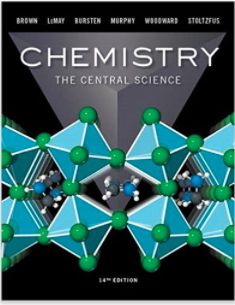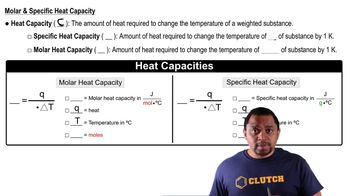A sample of gas is contained in a cylinder-and-piston arrangement. There is an external pressure of 100 kPa. The gas undergoes the change in state shown in the drawing. (b) Now assume that the cylinder and piston are made up of a thermal conductor such as a metal. During the state change, the cylinder gets colder to the touch. What is the sign of q for the state change in this case? Describe the difference in the state of the system at the end of the process in the two cases. What can you say about the relative values of E?

A house is designed to have passive solar energy features. Brickwork incorporated into the interior of the house acts as a heat absorber. Each brick weighs approximately 1.8 kg. The specific heat of the brick is 0.85 J/g•K. How many bricks must be incorporated into the interior of the house to provide the same total heat capacity as 1.7⨉103 gal of water?
 Verified step by step guidance
Verified step by step guidance
Verified video answer for a similar problem:
Key Concepts
Specific Heat Capacity

Heat Capacity

Conversion of Units

A coffee-cup calorimeter of the type shown in Figure 5.18 contains 150.0 g of water at 25.1°C A 121.0-g block of copper metal is heated to 100.4°C by putting it in a beaker of boiling water. The specific heat of Cu(s) is 0.385 J/g-K The Cu is added to the calorimeter, and after a time the contents of the cup reach a constant temperature of 30.1°C. (a) Determine the amount of heat, in J, lost by the copper block.
A coffee-cup calorimeter of the type shown in Figure 5.18 contains 150.0 g of water at 25.1°C A 121.0-g block of copper metal is heated to 100.4°C by putting it in a beaker of boiling water. The specific heat of Cu(s) is 0.385 J/g-K The Cu is added to the calorimeter, and after a time the contents of the cup reach a constant temperature of 30.1°C (b) Determine the amount of heat gained by the water. The specific heat of water is 4.184 J/1gK.
A coffee-cup calorimeter of the type shown in Figure 5.18 contains 150.0 g of water at 25.1°C A 121.0-g block of copper metal is heated to 100.4°C by putting it in a beaker of boiling water. The specific heat of Cu(s) is 0.385 J/g-K The Cu is added to the calorimeter, and after a time the contents of the cup reach a constant temperature of 30.1°C (d) What would be the final temperature of the system if all the heat lost by the copper block were absorbed by the water in the calorimeter?
